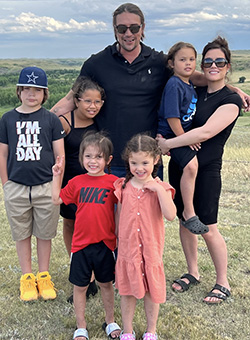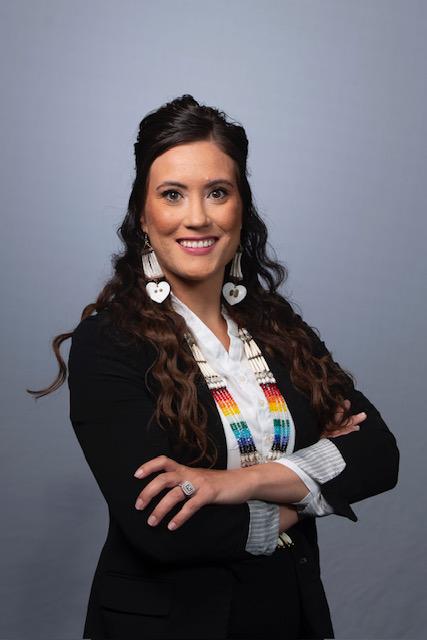 Jordyn Pourier is a research scientist for Indigenous Children, Youth, and Families within the Population-Focused Research program area at Child Trends.
Jordyn Pourier is a research scientist for Indigenous Children, Youth, and Families within the Population-Focused Research program area at Child Trends.
Jordyn, can you briefly introduce yourself and tell us about your primary research interest(s)?
I am Jordyn Pourier, Miniconjou Lakota, and an enrolled member of the Cheyenne River Sioux Tribe. I was born and raised on the Cheyenne River Reservation, where I gained first-hand experience that helped me understand health disparities and barriers American Indians face. I have dedicated my life to serving my community and other American Indian communities to improve members’ overall health and eliminate health disparities by addressing the social determinants of health.
Some of my current work focuses on maternal and child health research, specifically examining health policies to improve access to health care—an essential step toward addressing disparities uniquely affecting American Indian communities. Recently, I have concentrated on access to care during the perinatal period, which is crucial for ensuring healthier outcomes for both mothers and infants. In American Indian communities, this work is particularly vital because of persistent historical and systemic barriers to high-quality health care, heightened risk factors, and the need to integrate cultural considerations into prenatal care. Addressing these challenges not only supports the health of individuals but also strengthens the overall community by fostering a foundation of wellness for future generations.
What sparked your interest in research on Indigenous child, youth, family, and community well-being?
My experiences growing up on a geographically isolated American Indian Reservation in South Dakota led me to pursue a career in public health and health policy and management. My grandmother raised me, and I watched her and most of my community members navigate issues with their health care, from a lack of high-quality care to medical shortages. Witnessing these challenges made me want to grow my understanding of the health system and policies that guide it so that my work can inform policy changes that benefit Indigenous communities and families like mine.
In graduate school, I did an internship focused on maternal and infant health and quickly recognized the birthing inequities American Indians and Alaska Natives face. This experience, coupled with my own challenges navigating the health care system as a mother, motivated me to focus on maternal, infant, and child health. A supportive birthing experience and access to early interventions in the perinatal period can shape lifelong health trajectories, influencing everything from physical well-being to emotional resilience. Ensuring equitable access to these resources in American Indian communities not only addresses critical health disparities but also honors and strengthens cultural practices that promote family and community wellness.
What books have most influenced you?
While many books and articles have influenced me, Reproductive Justice: The Politics of Health Care for Native American Women, by Dr. Barbara Gurr, was instrumental in how I think about the consequences and impacts of health policy on American Indians. This book shared analysis of American Indian women’s reproductive health care and told the story of reproductive health care experiences on the Pine Ridge Reservation, shaping my perspective on the importance of culturally informed and equitable health care solutions.
What are your hobbies or interests outside of research?
I love spending time with my husband and children, enjoying outdoor activities, and supporting my kids as they develop their extracurricular interests. In recent months, most of our time has been spent going to my daughter’s volleyball and basketball games and exploring her interests in musical instruments. I enjoy being able to provide routine and structure for them and being able to treat myself to an iced coffee as we jump from one activity to the next.
To wrap up, can you tell us a fun or interesting fact about yourself?
As a child, I grew up on a ranch. My family is well-known on the Native American rodeo circuit, and some of my relatives are considered rodeo legends. My grandfather was the first Native American stock contractor for The Professional Rodeo Cowboys Association, providing bucking horses for rodeos. It’s a legacy I’m proud of, and I love sharing his story and the stories of our family’s ranch and rodeo experiences with my children.
© Copyright 2025 ChildTrendsPrivacy Statement
Newsletter SignupLinkedInYouTubeBlueskyInstagram